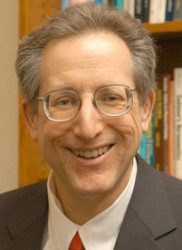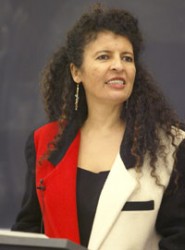 Jack M. Balkin |
Drake Law School hosted two speakers this fall as part of the Drake Constitutional Law Center’s Distinguished Lecture Series.
Jack M. Balkin, the Knight professor of constitutional law and the First Amendment at Yale Law School, spoke at Drake’s observance of Constitution Day on Thursday, Sept. 21, to a standing room-only crowd in Room 213 of Cartwright Hall.
Balkin’s speech, titled “How the Constitution Changes: Partisan Entrenchment and the National Surveillance State,” covered the past, present and future of the U.S. government, focusing on the current administration and surveillance issues.
He attributed the country’s changing landscape of surveillance and privacy rights to the aftermath of 9/11 and discussed the issues’ effects on civil liberties.
Balkin holds a Ph.D. in philosophy from Cambridge University and received his bachelor’s and law degrees from Harvard University. He served as a clerk for Judge Carolyn D. King of the U.S. Court of Appeals for the Fifth Circuit and practiced as an attorney in New York City before entering the legal academy.
 Penelope E. Andrews |
Penelope E. Andrews, professor of law at the City University of New York School of Law, spoke Thursday, Nov. 9. She discussed the South African Constitution and its impact on women’s equality vs. traditional cultures in her lecture, titled “Constitutional Embrace of Indigenous Values and Gender Equality in South Africa: a ‘Marriage’ Made in Heaven or One Headed for Divorce?”
Growing up in South Africa during the brutal apartheid control, she has witnessed the government’s transformation to a multi-racial democracy. In her lecture, Andrews cited several recent court examples revealing the problems posed when values of equality and respect of indigenous people’s rights conflict, such as the recent high-profile rape trial against Jacob Zuma, the former deputy president of South Africa. During the trial, Zuma drew from his native Zulu culture as a defense.
Andrews asserted that South Africa’s constitution – which she referred to as one of the most liberal in the world – could provide insights for other struggling governments, particularly developing democracies in Iraq and Afghanistan. The key difference, Andrews said, is that a baseline for establishing democracy existed in South Africa. “Everyone believed, at least formally, that inequality should not be tolerated,” she said.
Though she said that she senses such a strong desire for gender equality may not pervade the Iraqi and Afghanistan societies at this point, the outlook is not entirely negative. “I do have hope, because there are remarkable women doing remarkable things and working against tremendous odds,” Andrews said.
Andrews earned two undergraduate degrees from the University of Natal in Durban, South Africa, and holds a Master of Law degree from Columbia Law School. She is working on a manuscript on women’s rights, “From Capetown to Kabul: Rethinking Women’s Human Rights,” and is the contributing co-editor of “The Post-Apartheid Constitutions: Reflections on South Africa’s Basic Law.” She also is editor of a forthcoming volume titled “Comparative Constitutionalism and Rights: Global Perspectives.”

